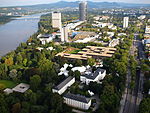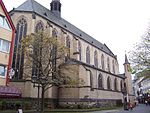The Cologne War (German: Kölner Krieg, Kölnischer Krieg, Truchsessischer Krieg; 1583–1588) was a conflict between Protestant and Catholic factions that devastated the Electorate of Cologne, a historical ecclesiastical principality of the Holy Roman Empire, within present-day North Rhine-Westphalia, in Germany. The war occurred within the context of the Protestant Reformation in Germany and the subsequent Counter-Reformation, and concurrently with the Dutch Revolt and the French Wars of Religion.
Also called the Seneschal's War (Truchsessischer Krieg) or the Seneschal Upheaval (Truchsessischer Wirren) and occasionally the Sewer War, the conflict tested the principle of ecclesiastical reservation, which had been included in the religious Peace of Augsburg (1555). This principle excluded, or "reserved", the ecclesiastical territories of the Holy Roman Empire from the application of cuius regio, eius religio, or "whose rule, his religion", as the primary means of determining the religion of a territory. It stipulated instead that if an ecclesiastical prince converted to Protestantism, he would resign from his position rather than force the conversion of his subjects.
In December 1582, Gebhard Truchsess von Waldburg, the Prince-elector of Cologne, converted to Protestantism. The principle of ecclesiastical reservation required his resignation. Instead, he declared religious parity for his subjects and, in 1583, married Agnes von Mansfeld-Eisleben, intending to convert the ecclesiastical principality into a secular, dynastic duchy. A faction in the Cathedral Chapter elected another archbishop, Ernst of Bavaria.
Initially, troops of the competing archbishops of Cologne fought over control of sections of the territory. Several of the barons and counts holding territory with feudal obligations to the Elector also held territory in nearby provinces: Westphalia, Liege, and the Southern, or Spanish Netherlands. Complexities of enfeoffment and dynastic appanage magnified a localized feud into one including supporters from the Electorate of the Palatinate and Dutch, Scots, and English mercenaries on the Protestant side, and Bavarian and papal mercenaries on the Catholic side. The conflict coincided with the Dutch Revolt, 1568–1648, encouraging the participation of the rebellious Dutch provinces and the Spanish. In 1586, the conflict expanded further, with the direct involvement of Spanish troops and Italian mercenaries on the Catholic side, and financial and diplomatic support from Henry III of France and Elizabeth I of England on the Protestant side.
The war concluded with the victory of the Catholic archbishop Ernst, who expelled the Protestant archbishop Gebhard from the Electorate. This outcome consolidated Wittelsbach authority in north-west Germany and encouraged a Catholic revival in the states along the lower Rhine. More broadly, the conflict set a precedent for foreign intervention in German religious and dynastic matters, which would be widely followed during the Thirty Years' War (1618–1648).










